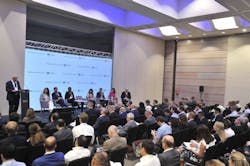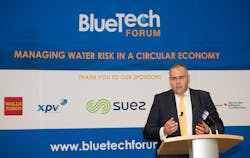Highlights from IDA’s desalination conference in Spain and the BlueTech Forum in Canada
IDA’s international water reuse and recycling conference explored regulation frameworks, financing trends and new technology
More than 180 delegates from 29 countries gathered at the 2018 International Desalination Association (IDA) International Water Reuse and Recycling Conference in Valencia, Spain, to discuss water reuse regulation frameworks, financing trends and technology advancements.
The first day of the technical program began with two panel discussions and a plenary session. Moderated by Carlos Cosín, IDA officer and CEO of Almar Water Solutions, the first panel "The Big Debate: Water Reuse Regulations in Europe, USA and Asia" examined regulations that cover the various uses, requirements and advantages in using water reuse technology to meet growing water needs for agriculture, industry and urban uses, as well as aquifer recharge, to offset water needs.
"The regulatory frameworks have been critical in areas where reuse is today a reality, such as in the state of California (USA), Israel, Spain and Singapore," said Cosín. "To chart prominent growth in new geographies, a clear framework to advance and develop the implementation of reuse is needed. We should extend current regulations to include new categories and uses to cover new applications. Irrigation is now extensively covered, but industrial and direct and indirect potable use need to become easier to implement. There are credible and transparent local regulation frameworks such as Title 22 in California that could be considered as a baseline that could help to develop reuse in new areas."
In the second panel, "Pricing Water Security and Enhancing Practical Financing Tools for Reclaimed Wastewater Reuse," speakers discussed specific approaches to pricing water security through the diversification of water supplies and the tools they use to finance and develop water-reuse infrastructure projects to meet irrigation and urban needs, and other water requirements. Moderators were Dr. Gonzalo Delacámara, senior research fellow and coordinator of water economics at IMDEA Water Research Foundation, and Dr. Eduardo Orteu, head of support unit and responsible for the International Affairs Service at the Spanish Water Directorate.
"The discussion showed the relevance of a two-fold discussion," said Dr. Delacámara. "On one side is the creation of the necessary setup to guarantee financial resources for upfront capital investments for reclaimed water reuse, which also includes, in some countries, strengthening the wastewater treatment capacity. This requires striking the right balance between grants from the public sector and multilateral donors and new public-private partnerships, trying to avoid that public investment, albeit important, crowds out private inputs.
"On the other side, in order to ensure the operation (including maintenance and asset replacement) of those plants, it is critical to redesign incentives. This mainly calls for new pricing schemes towards long-term water security, emphasizing on the diversification of water supply sources and enhanced resilience. It also calls for the acknowledgement of new revenue streams, such as those stemming from biosolids and biogas. Funding, financing and pricing need to align individual interests and collective goals, i.e., ensuring water security within a climate change adaptation context."
Concluding this portion of the program was a plenary session on "Research and Market Trends: Thematic Shifts and Macro Level Drivers," which explored the role of decentralized water and the impact associated with rolling out the Internet of Things and the digital economy on the value chain and technology landscape. Session moderator Tim David Chinn, SVP and executive consultant, Drinking Water Program at AECOM, facilitated discussion among panel keynote speakers Jeff Mosher, principal technologist VP, Carollo Engineers Inc.; Paul O’Callaghan, CEO, BlueTech Research; and Julie Minton, director of strategic initiatives, The Water Research Foundation.
The afternoon concluded with a session on "Water in the Circular Economy," presented by iAgua, a communications platform for the water sector in Spain and Latin America and media partner of the conference. This session began with a dialogue between Félix Parra, general director of Aqualia, and Alejandro Maceira, director of iAgua, and included presentations by Gari Villa-Landa, head of International Affairs of AEAS; Santiago Martínez, managing director of concessions of Almar Water Solutions; Jorge Malfeito, R&D director of Acciona Agua; José Ferrer, head of Water Quality Investigation Group of IIAMA; and a representative of Fira de Barcelona Iwater and the Circular Economy European Summit.
The program also included a preconference training course, “State of the Art in Water Reuse,” conducted by Antonio Casanas, key account manager, Dow Water and Process Solutions, and Dr. Domingo Zarzo, AEDyR president, research and development manager of Valoriza Agua. IDA and AEDyR offered conference delegates a tour of Valencia’s reuse application sites and the UNESCO World Heritage site of the Valencia Ancient Court of Water.
Highlights and innovation winners at BlueTech Forum 2018 in Canada
The BlueTech Forum in Vancouver, Canada, attracted 200 delegates to discuss ways to reduce water use as well as recover and reuse a range of resources.
Reflecting on the forum, BlueTech Research‘s Paul O’Callaghan said: "We’ve had a really diverse group of people here at BlueTech Forum. Having the large strategic corporates here and the larger water technology companies is fantastic, each of those is part of this future vision for water. One thing that struck me was the degree to which corporate water end users are providing solutions directly within their communities, whether that was Walmart or a mining company in Chile or Peru. They’re doing things sometimes that the utilities are unable to do and becoming part of the solution both within their own factories and within the communities in which they operate.”
Speakers included:
Menno Holterman, chief executive of Nijhuis, inspired delegates with case studies from around the world where circular economy approaches are helping clients meet regulatory and cost requirements alongside resource efficiency. This included an energy-neutral anaerobic digestion plant for industrial wastewater in Egypt and a self-sustaining floating farm for 48 cattle in the center of Rotterdam.
Nijhuis chief executive Menno Holterman tells delegates about the company’s resource-efficient wastewater projects in industry, agricultural and utility applications. Courtesy of BlueTech
Space scientist Michael Flynn explained how water recycling systems for astronauts travelling to Mars will have to be as dependable as the one built into the human body. "We’re focusing a lot on biomimetic technologies, trying to get away from these machines that break down all the time," he said. "We have a project now where we’re developing a small intestine based water-recycling system, so a lot of our work is based on forward osmosis because that’s how the small intestine works. We’re also doing a lot of work developing living membranes that are self-cleaning."
Jens Kolind, chief executive of Novozymes, discussed how applying biotechnology to wastewater treatment can reduce energy and chemical use, clean up biofilms and reduce sludge quantities.
Delegates also heard from 14 industrial end users, utilities and municipalities about their requirements for water technologies and services.
Hans-Ulrich Buchholz, environmental compliance manager at cosmetics company L’Oreal, said the company is rolling out a "dry factory" approach to reduce municipal water consumption across its production facilities and was now looking for "disrupting technologies that are more eco-efficient" to improve treatment processes and reduce energy consumption and waste.
Eddie Corwin, sustainability program manager at Google, said the tech giant was looking for ways to optimize water use within existing municipal structures for water supply and wastewater collection across its real estate portfolio. "Figuring out opportunities to go beyond efficiency within our operations and further reduce our potable water use is one of our biggest challenges," he said.
Award winners
Aquacycl, based in California, won Best Technology Innovation for its bioelectrical treatment technology, BETT, which can directly convert sewage to electrical energy without methane generation. Two pilot projects processing municipal and swine wastewater have demonstrated much faster treatment times than standard aerobic and anaerobic processes and a reduction in operating expenditure.
Canadian start-up Emagin won the Best Market Strategy award for its operational intelligence platform that enables utility operators to manage infrastructure in real time.

